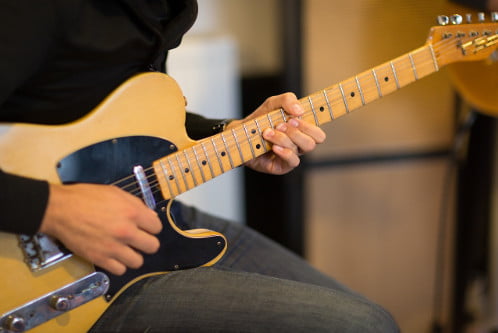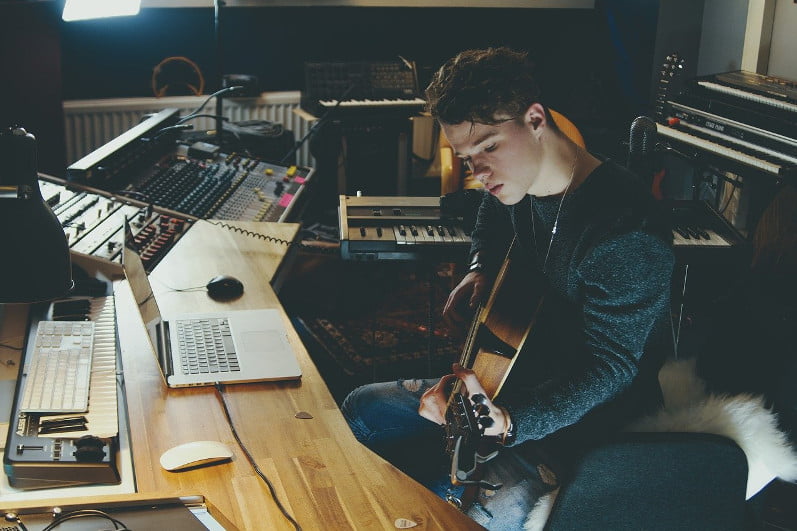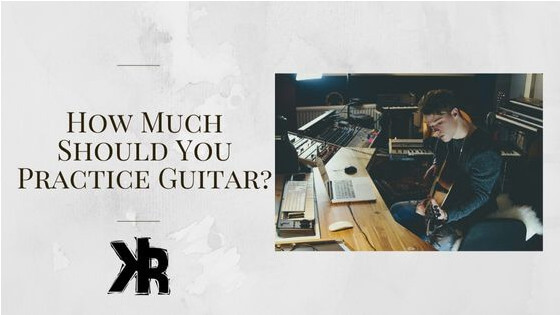Table of Contents
Setting goals and reaching them relies on a solid practice schedule. If you have been playing for a while, you have probably got one down that suits your needs.
But if you are just getting started or have been looking to improve, you might need some insight. You may be wondering, how much should I practice guitar each day?
Depending on your skill level, a practice session will look different to most players. A beginner will physically only be able to play short sessions before fatigue sets in. Whereas an advanced player will be able to play longer.
How Much Should You Practice Guitar Everyday?
- Consistent Practice: Aim to practice guitar for at least 15 minutes per day, five days a week. Consistency is crucial for steady improvement.
- Avoid Marathon Sessions: Steer clear of long and unbroken practice sessions that last longer than one hour. These can lead to fatigue and decreased focus.
- Smart Scheduling: If you’re in the zone and want to practice for more than 20 minutes, make sure to set short breaks. This helps to keep your mind fresh and your fingers nimble.
- Daily Focus: Each day, prioritize what needs to be worked on. Whether it’s a new chord or a tricky song, targeted practice is more effective.
- Diverse Strategies: Don’t stick to just one method of practice. Incorporate a variety of strategies to maximize your learning and make your practice sessions more engaging.
Benefits of Shorter Sessions
Throbbing fingertips and sore hands will tell you it’s time to stop. But for those who are doing 4-hour practice sessions twice a week, at some point your focus will be lost.
Usually, this will happen after the first hour, once you begin to tire out. Now, if you are trying to apply something that needs to be held in memory, you are not doing yourself any favors. An hour max is really all you are going to get for efficient memorization.
A strategy called Distributed Practice has been shown to be very effective. Smaller increments of study over a longer period prove to lock the concepts into place. This helps to master the concept by moving it from temporary memory to long-term memory.
It’s a benefit of shorter practice sessions, but you must be sure to make good use of the time. Long sessions are useless if they are filled with noodling and distraction.

Making the Most Out of Practice Sessions
You’ve set aside time for practice, but how do you ensure that every minute counts? The key is to practice smart, not just hard. Here are some strategies to help you get the most bang for your buck during your guitar practice sessions.
Effective Techniques
Start by identifying the techniques that need improvement. Whether it’s fingerpicking, strumming, or mastering scales, focus on one technique at a time. Use drills or exercises specifically designed to improve that technique.
Time Management
Allocate specific time slots for different aspects of guitar playing. For example, spend the first 10 minutes on warm-up exercises, the next 15 minutes on a new song, and the last 5 minutes on improvisation. This ensures a balanced practice session.
Quality Over Quantity
It’s easy to fall into the trap of repetitive strumming without much thought. Instead, aim for focused, quality practice. Slow down if you have to, and make sure each note is clear and precise.
Use a Metronome
Timing is everything in music. A metronome can help you keep pace and improve your timing. Start slow and gradually increase the speed as you become more comfortable.
Record Yourself
Sometimes, we’re not the best judges of our own performance. Recording your practice sessions can provide valuable insights into areas for improvement. Listen to the playback critically and make necessary adjustments.
Mix It Up
Variety is the spice of life, and the same goes for your practice routine. Incorporate different musical styles, try out new songs, or even switch between electric and acoustic guitars to keep things interesting.
By implementing these strategies, you’ll not only make your practice sessions more effective, but also find them more enjoyable. So go ahead, pick up that guitar and make every minute count.

How to Avoid Burnout
When your fingers feel like they’re made of lead and even the thought of picking up your guitar makes you wince. It’s a real thing, and it can seriously derail your progress. But don’t worry, there are ways to sidestep this pitfall.
Know the Signs
First off, be aware of the early signs of burnout. These could include physical discomfort, a lack of enthusiasm, or even a sense of dread before practice. If you notice these signs, it’s time to take action.
Take Short Breaks
If you’re practicing for extended periods, make sure to take short breaks. A 5-minute walk or some light stretching can do wonders for your focus and energy levels. It’s like hitting the reset button on your practice session.
Change the Scenery
Sometimes, a change of environment can work wonders. If you always practice in the same room, try moving to a different space. The new surroundings might just give you the boost you need.
Set Realistic Goals
One common reason for burnout is setting unattainable goals. While it’s good to aim high, make sure your goals are achievable in the short term. Celebrate the small wins; they add up.
Diversify Your Routine
Doing the same thing over and over can get monotonous. Add variety to your practice sessions by including new songs, techniques, or even playing along with backing tracks. This keeps your practice sessions fresh and engaging.
Listen to Your Body
Last but not least, listen to your body. If you’re feeling physically or mentally drained, it might be a good idea to take a day off. Remember, it’s a marathon, not a sprint.
Tracking Your Progress
Keeping tabs on your progress is crucial for sustained improvement. It’s like having a roadmap that shows you how far you’ve come and what’s left to explore. Here’s how to effectively track your progress in a structured manner.
Create a Practice Log
Start by maintaining a practice log where you jot down what you worked on each day. This could be as simple as a notebook or as advanced as a specialized app designed for musicians.
| Date | Technique Practiced | Time Spent | Observations | Goals for Next Session |
|---|---|---|---|---|
| 09/22/2023 | Fingerpicking | 20 mins | Improved speed | Master a new pattern |
| 09/23/2023 | Scales | 15 mins | Struggled with timing | Work on timing |
| 09/24/2023 | New Song | 30 mins | Learned first verse | Learn the chorus |
Use Video Recordings
In addition to a practice log, consider recording your practice sessions. This allows you to visually track your progress over time. You can compare videos to see how you’ve improved.
Set Milestones
Set specific milestones you want to reach. These could be learning a particular song, mastering a difficult technique, or even performing in front of an audience. Celebrate when you reach these milestones; they’re proof of your hard work.
Regular Self-Assessment
Every month, take some time to assess your progress. Go through your practice log, watch your videos, and see how far you’ve come. Use this information to adjust your practice routine and set new goals.
Seek External Feedback
Don’t underestimate the value of external feedback. Whether it’s from a teacher, a fellow musician, or even an online community, other perspectives can provide valuable insights into your progress.
By systematically tracking your progress, you’ll have a clearer picture of your strengths and weaknesses. This, in turn, allows you to tailor your practice sessions for maximum effectiveness. So, get that log started and take the guesswork out of your guitar practice.
The Exceptions: When More Time is Needed
Sure, general guidelines are helpful, but there are times when you’ll need to kick things up a notch. Here’s a breakdown of those special circumstances and how to navigate them:
Preparing for a Performance
- Time Allocation: Increase practice time significantly.
- Setlist Focus: Zero in on the songs you’ll perform.
- Technical Prep: Work on tuning, sound checks, and stage presence.
Auditions and Competitions
- Quality Over Quantity: More focused, high-quality practice is essential.
- Mentorship: Consider working with a teacher or mentor for specialized guidance.
Skill Plateaus
- Identify the Issue: Pinpoint what’s holding you back.
- Purposeful Practice: Increase practice time but make it goal-oriented.
Advanced Techniques
- Deep Dive: Allocate entire sessions to mastering complex techniques.
- Repetition and Review: Consistent repetition and review are key.
Professional Aspirations
- Time Investment: Consider multiple hours of practice per day.
- Treat it Like a Job: Your practice routine should be as structured as a workday.
In these special cases, it’s not just about putting in more hours. The quality of your practice sessions needs to be top-notch. Tailor your routine to meet these exceptional needs, and remember, even when the going gets tough, self-care is crucial to avoid burnout.

Conclusion
So there you have it! A comprehensive guide to not only how much you should practice your guitar each day, but also how to make every minute count.
From the basics of setting aside at least 15 minutes a day to the nuances of avoiding burnout and tracking your progress, we’ve covered it all. And let’s not forget those special circumstances when more focused and extended practice sessions are needed.
Remember, the journey to becoming a skilled guitarist is a marathon, not a sprint. Consistency, smart planning, and a dash of variety can go a long way in making your practice sessions both effective and enjoyable.
So pick up that guitar, set some achievable goals, and get your mind set right. Once you invest the time and reach your milestones, the investment is so worth it!
FAQs
Can you practice guitar too much?
It’s possible to practice the wrong things too much. This can lead to frustration and a lack of progress. This is never beneficial, which is why we speak of having a plan and goals so often.
Do you have a plan with the proper goals in place? Then the time you spend practicing, even if it’s 6 hours a day, it’s never too much.
There are guitar players who put in 6 hours a day of practice time. It’s never all at once, of course, but they know what it is they are working on and have the right perspective.
Should I force myself to practice?
We get it, some days you don’t feel like practicing! But if this is important to you, then you have to revisit your plan! If you’re just getting going, you need to make sure you are doing things that are fun! Focus on a song you love to help motivate you.
Reassess your plan to make sure the material you are using is getting you closer to your goals. I mean, you did start out by creating goals, right? Made a solid practice schedule?
Your motivation to play will need to come from a passion to want to progress. It’s just like anything else you do, you need to have some interest in it.
Find for yourself whatever it is that made you want to start in the first place and explore it. Then create your plan. Give yourself time to improve as well, and don’t expect too much too soon.
Is one hour of guitar practice enough?
One hour of guitar per day will help you progress quite rapidly in your skills and abilities. It’s the optimal amount of time to practice each day. We suggest that if you are going to work for 60 minutes, you break the hour into two periods.
It’s a good idea to take a small break after around 30 minutes to get a more effective practice session. This will allow you to focus better when practicing. Cramming in an hour isn’t as effective.
Plan your practice sessions with goals and execute them every day. Your skills will improve, and this in itself will motivate you to continue. So how much should I practice guitar each day comes down to this. Anything more than 1 hour should be considered time to noodle or play the guitar.

